Thunders Of ‘Thor’ Echo Biblical Truths, Part 2
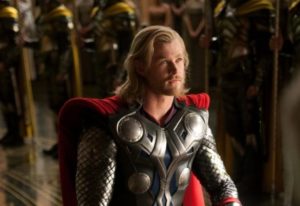 This morning, before my wife left for work, I caught sight of two books in the car’s backseat: the Bible, and Harry Potter and the Sorcerer’s Stone, which she finished re-reading.
This morning, before my wife left for work, I caught sight of two books in the car’s backseat: the Bible, and Harry Potter and the Sorcerer’s Stone, which she finished re-reading.
Naturally this pairing made me smile. Though we don’t enjoy Harry Potter books or the Bible (and we hope the Bible more!) only because some supposed villain out there can’t stand either book, it did occur to me that someone might think this odd, even blasphemous.
Similar reactions might result from this column, and last week’s part 1, which suggest: God’s truths can be echoed even in a movie whose lead character was inspired by a pagan “god.”
Yes, Thor is originally the “god of thunder” from Norse mythology, but in the Marvel film Thor he’s shown only as a mighty immortal hero from an alternate planet/dimension. Either way, enjoying this film isn’t automatically idolatry. (If you think it is, then you and those who ask online questions like Do you own movies in which people take God’s name in vain? should be consistent and get off the internet, which other people use for actual blasphemy!)
Rather, I enjoyed Thor’s storytelling, amazing acting and excellent effects because of seven echoes that reminded me of God’s truth. Here are the last four, and mostly spoiler-free.
4. Christ-and-his-Church-echoing romance
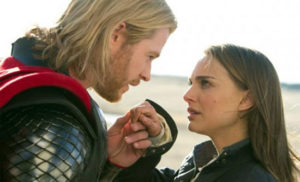 Before Thor is banished to Earth for his arrogance (anyone familiar with the movie’s trailers or summaries knows this already), he is still shown as a character audiences cheer for, even while seeing his sins. The film’s writers, producers and actors captured this balance very well — Thor is neither the clichéd Bad Boy, nor the stereotypical Angsty Hero who must See the Good He Truly Possesses Inside and simply get in touch with that to save the world.
Before Thor is banished to Earth for his arrogance (anyone familiar with the movie’s trailers or summaries knows this already), he is still shown as a character audiences cheer for, even while seeing his sins. The film’s writers, producers and actors captured this balance very well — Thor is neither the clichéd Bad Boy, nor the stereotypical Angsty Hero who must See the Good He Truly Possesses Inside and simply get in touch with that to save the world.
No, Thor must learn from others, even those whom he might consider inferior to himself. And it’s clear to see that he does think of the humans he meets in this way, while at the same time not acting disgusted with them or rude. Rather he’s humble and noble toward them, at least on the surface, even before his true humbling begins. Again, the story is well-balanced.
And of course, among those mortals is a woman named Jane, who becomes his love interest. The film doesn’t emphasize the mush, but it’s there nonetheless, and more powerful because it’s subtle. Thor is kind and chivalrous. He kisses a lady’s hand and makes her blush, even in the 21st century. He promises to return to her, and means it; he’s clearly but subtly shown as a strong servant. This is classic stuff, and even better, Biblical (Eph. 5: 22-33). Christian men’s groups that want to do more than pancake breakfasts would enjoy seeing this film!
I’ve read no criticism saying Ugh, that was really bland; a slick prolonged sex scene would have been more realistic. So the story didn’t need immoral crap to work.
Also, the story manages to do all that while also including the character of an Asgardian warrior, Sif, a woman, who doesn’t behave like the typical impractically and scantily clad, Anything Men Can Do I Can Do Better Battle Vixen™.
5. Myths that prove true
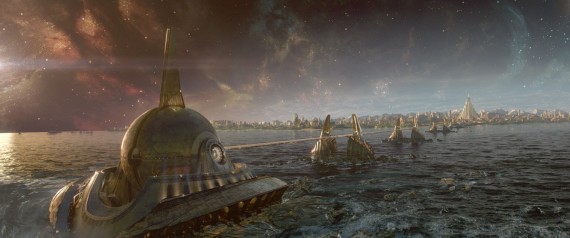
Thor: “Your ancestors called it magic, but you call it science. I come from a place where they are one and the same.”
Partway through the film, when the scientist team that encountered Thor are coming to grips with who he is, Dr. Erik Selvig, mentor to Jane — though not her father, he acts like it — is skeptical. He’s of Norwegian heritage (you can tell because of the K in his first name), and he says it’s not possible for all those stories he as a child heard about Odin, Thor, and a magic hammer to be true. Really, a rainbow bridge between realities? He even has a storybook with an illustration of one of the “gods” coming down a literal curved rainbow to the earth.
More open to the possibilities, Jane fires back the oft-repeated quote from author Arthur C. Clarke: “magic is just science we don’t understand.”
While that’s true and makes perfect sense in the film’s story, I think also about some people’s reactions to Biblical accounts. They’re skeptical. But based on a storybook containing cheesy, child-level illustrations of Biblical events or miracles — a five-year-old boy fighting a giant, a yacht-sized Noah’s Ark with giraffes’ necks protruding from windows — and of course it will look absurd and unbelievable. You can’t believe that stuff. All fairy tales and myths.
But why be skeptical based on how people have wrongly or simplistically retold the stories?
Just like the Norse legends about a “god” sliding down a solid rainbow to Earth: what if the deeper reality were true? In the film we find out early there really is a “rainbow bridge,” to the Bifröst, a fantastic magic/machine that’s a combination of warp drive and transporter beam, for travel between worlds. So the rainbow illustration wasn’t wrong, just simplistic.
That’s Thor’s fiction, echoing reality: Scripture’s histories may seem silly when people tell or illustrate them, but let us not endorse people’s skepticisms based on their reactions to that.
6. Fantastic forecasts of New Earth
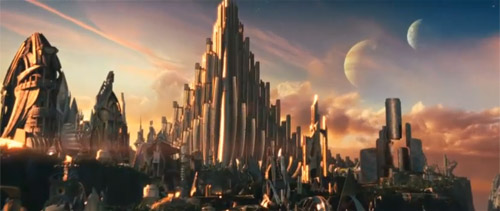 It’s like heaven, people said, even hardened geeks who may like to act like they’ve seen it all, in reaction to the film’s portrayal of the distant realm of Asgard. It hovers in the clouds … it’s another planet … it’s another dimension, just off the edge of outer space … it was somewhat difficult to tell exactly. But it looked amazing: futuristic, but traditional, a vast garden and city with towering spires shining in the light from a sun you don’t quite see.
It’s like heaven, people said, even hardened geeks who may like to act like they’ve seen it all, in reaction to the film’s portrayal of the distant realm of Asgard. It hovers in the clouds … it’s another planet … it’s another dimension, just off the edge of outer space … it was somewhat difficult to tell exactly. But it looked amazing: futuristic, but traditional, a vast garden and city with towering spires shining in the light from a sun you don’t quite see.
Yes, this reminded me of the New Jerusalem, as promised to descend to a remodeled, sin-cleansed New Earth (Rev. 21-22). I wonder if designers were thinking of those old Sunday-school pictures of Heaven. While perhaps wrongly intended to be about some out-there place to live forever instead of this very Earth made new, they still flicker in our minds.
I think we need more of those images. If Christians truly believe in a future New Heavens and New Earth, ruled by the perfect King, then we must tell stories about it.
Thor did, though its writers likely didn’t know it. And its Asgard echoed to me New Earth.
7. Thor’s sacrificial, humble heroes
Finally, the film didn’t fall into a phenomenon for which I’ll make up a name right now: the Star Trek Motion-Picture Incompetent Captains Syndrome. Maybe you know what I mean — the tendency to reduce other captains in Star Trek original-series films, just a little bit, in ability and intelligence, for the purpose of making Captain Kirk stand out more.
But whatever other things the recent Star Trek film (2009) got wrong, that wasn’t one of them. I recall a 2007 interview with one scriptwriter, who said clearly that he wanted to make Trek’s captains in the new film, including the captain of the doomed starship Kelvin, and Kirk’s own father, and Christopher Pike, into strong characters. Why? Kirk needed to have inspirations, he explained; Kirk could be great along with these captains, and grow even more, because of their strengths, not to compensate for their weaknesses.
Oddly enough, Thor actor Chris Hemsworth was in Star Trek as Kirk’s father, who sacrifices himself to save lives. (Beware heavy spoilers.) And so does Thor himself near the end of Thor, when all seems lost, and only self-sacrifice can prevent the deaths of innocents.
Naturally this reminds me of Christ. Any hero who sacrifices himself to save others will do that. It’s part of the all truth is God’s truth that can get into even pagan mythologies.
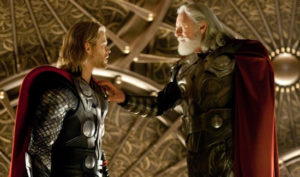 In this story, of course, Thor sacrifices himself to save those he loves, many of whom have helped him, and who are in his words innocent humans. As a Christian I do love to see this, yet with the subtle reminder: Christ wasn’t only killed by villains, but by God Himself, and crushed (Isaiah 53) in place of His enemies: human rebels guilty of rejecting Him.
In this story, of course, Thor sacrifices himself to save those he loves, many of whom have helped him, and who are in his words innocent humans. As a Christian I do love to see this, yet with the subtle reminder: Christ wasn’t only killed by villains, but by God Himself, and crushed (Isaiah 53) in place of His enemies: human rebels guilty of rejecting Him.
Yet later we find Thor also fighting to save his enemies — wicked Frost Giants — from being slain by someone close to him. Now that is something we don’t see in many action films.
What also of King Odin, Thor’s father? One can’t draw many parallels between him and the real God the Father, for sure, but some similarities are there — especially the fact that Odin shows both wrath and love. And it works. We accept this as believable, for a character very like a man. So why, I wonder, is it so hard for many people (even Christians) to believe in a God Who manifests the same seemingly “contradictory” characteristics of love and wrath?
So there you are. See Thor, if you haven’t already, and share what you thought. Perhaps you saw many of these truths echoed, or more I didn’t mention. Or perhaps you aren’t sure about something I said and you need to “hammer” out some questions. … Yes. I had to get that in.





















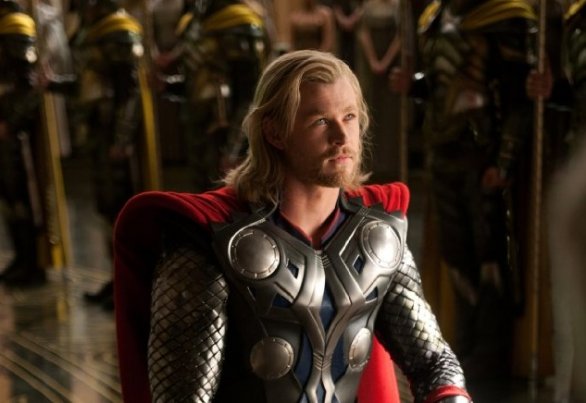







I’d love to see a realistically-illustrated “children’s Bible”. That would be awesome! I despise children’s Bibles for just that reason…they are so cutesy and trite, and simplistic. I’d much rather read my son the REAL Word of God – blood, sins, and all (within reason; some stories might wait until he’s a tad older). That’s what they were read for centuries, so I don’t see why the Bible is considered too heavy or complicated for today’s young children. Illustrations, though, do a lot to hold the attention of a young child. To have a children’s Bible that contains realistic illustrations and real, verbatim Scripture passages would be amazing.
Sorry, I know that’s a little off-topic, but that’s a pet peeve of mine. 🙂 I can’t say much about Thor as I haven’t seen it…your reviews here are making me want to see it, though!
E, great post! I enjoyed all 7 echoes of Christ you mentioned. I’m going to have to see Thor again to see what else I can find (I will report back, deal?).
You mentioned seeing more art and literature on the New Heaven. Patricia King has a book that she wrote for her grandson in which a young boy travels to Heaven and meets THE KING. I haven’t made time to look at it yet, but my wife and everyone else at our church who has read it give rave reviews. Here’s a link with more details.
As always, thanks. My wife and I had some of the same thoughts on the way home from seeing the movie.
I’m so glad to have found someone who saw the same things I did in this movie.. I just watched it for the first time last week, yes I know just a tad bit late, but OMGosh.. So many things I saw that seemed Kingdom minded. One part I saw was when when the mother tells the brother of Thor, something about the king always has a purpose in everything he does!!!! It made me see God more clearly.. I saw so much of His relationship with us, His children… I also saw the new earth as you did…
I believe alot of movies we’ve seen lately, its like God Himself has been sending clues and messages to His people.. I highly doubt this is all our own imagining. For me its like Him saying all those times I believe I’m just dreaming, Its really Him speaking and revealing who He is.. He said He would reward those those never stop seeking Him;)
Oh, you can make a few parallels from Odin. “He does nothing without purpose” and his actions are often misinterpreted up front. And what both brothers had to understand – what Odin already understood – was that the lives of the people of the nine realms were of much greater value than the original offense of a few Frost Giants breaking in and the resulting offense to Thor’s personal glory and honor. It was worth a little indignity to do something more glorious: protect the lives of thousands.
[…] Next week: romance, myths and a sacrificial hero. Continued in Thunders of ‘Thor’ Echo Biblical Truths, part 2. […]